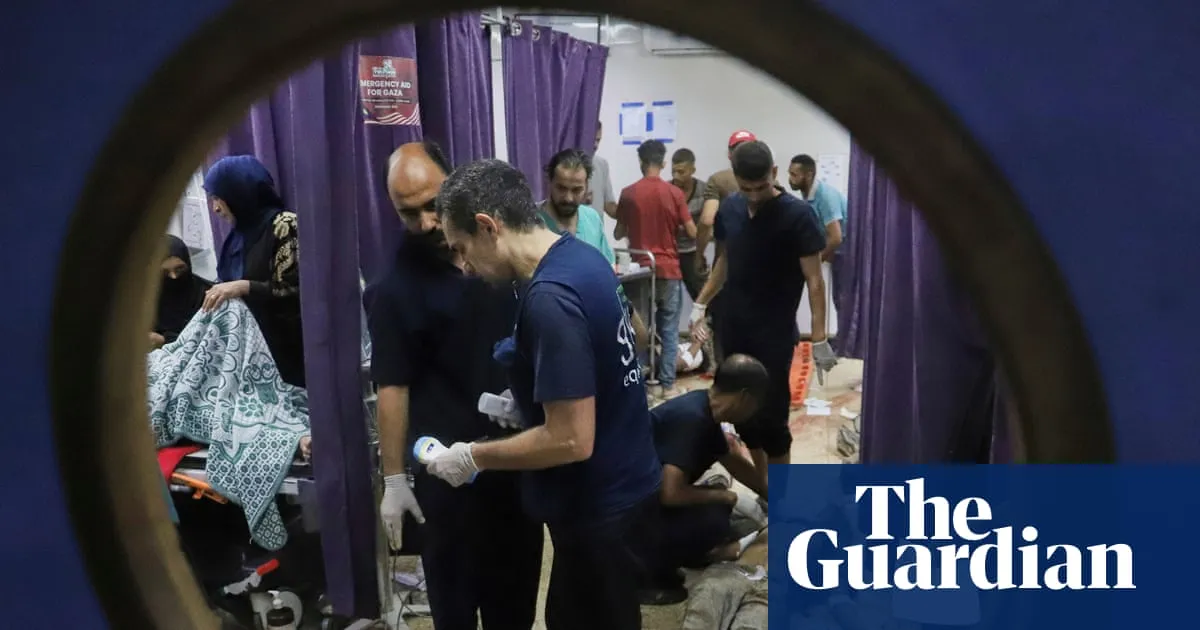
Doctors and medical staff in Gaza are facing an alarming crisis as hunger and food shortages are beginning to weaken their ability to provide essential medical care to a growing number of malnourished and injured civilians. Reports from nearly a dozen medical professionals across the territory, shared with the Guardian and the Arabic Reporters for Investigative Journalism (ARIJ), highlight their desperate search for food and the deteriorating health conditions due to prolonged hunger.
“They are in a state of extreme exhaustion. Some have fainted in the operating rooms,” stated Dr. Mohammed Abu Selmia, the director of al-Shifa hospital in Gaza City. He emphasized that like the general population, medical staff have not received any aid or meals in the last 48 hours. “Medical services will be affected because our staff will not be able to hold out any longer in the face of this famine,” he added, underscoring the dire state of healthcare in the region.
Many doctors and medical practitioners have reached out to the Guardian but opted to remain anonymous due to fears of being targeted by the Israeli military. One physician at al-Shifa hospital shared, “Today I have been on a 24-hour shift. At the hospital, we are supposed to receive rice for each shift, but today there was none. My colleague and I treated 60 neurosurgery patients, and right now I can’t even stand.”
Another general practitioner volunteering at al-Shifa expressed the immense difficulty they face: “I haven’t had anything to eat since yesterday, and my family has nothing to eat. I keep thinking about how to get them flour or lentils, but there’s nothing in the markets. We are no longer able to walk. We don’t know what to do.”
A surgeon at the Nasser medical complex reported a surge in patients presenting symptoms related to malnourishment. “There is a high number of patients suffering from gastroenteritis, fainting, and low blood sugar across all age groups coming into the hospital,” he explained. The impact of malnutrition is also evident, with an increase in post-surgical complications. “I couldn’t eat for two days because I feared worsening my own gastroenteritis, and because of my low blood pressure, I had to stop during a surgery on a girl who had been shot in the abdomen,” he added, revealing the high stakes faced by medical staff.
Dr. Abu Selmia further highlighted the urgent need for special nutrition for vulnerable patients, particularly children. He reported that 21 children had died in the Palestinian territory over the past three days “due to malnutrition and starvation.” The lack of nutritional resources is exacerbating the risks faced by patients, many of whom are dying in their homes, unnoticed.
In a recent statement, UNRWA chief Philippe Lazzarini revealed that his team has received alarming reports of healthcare and aid workers across Gaza fainting from hunger and exhaustion. Some medical staff are caught in a dilemma—whether to continue providing urgent medical care or venture out to search for food for their families. Others express fear of being forced to visit food distribution sites run by the Gaza Humanitarian Foundation, which are guarded by the Israel Defense Forces (IDF), the only places where food and aid are currently being distributed to civilians in Gaza.
The situation is further complicated by the ongoing conflict, which has devastated Gaza’s healthcare system. According to the World Health Organization, as of May, at least 94% of hospitals in the Gaza Strip have been damaged or destroyed, leaving only 19 of the 36 hospitals operational. “In recent days, healthcare workers in Gaza have collectively reported unprecedented levels of food insecurity, lowered immunity, repeated infections, severe fatigue, and frequent fainting during surgeries and rescue missions,” stated Muath Alser, director of Healthcare Worker Watch, a Palestinian medical organization. “We cannot afford mere condemnation. We need urgent action.”
In response to the ongoing crisis, the IDF has stated that it is working to facilitate the distribution of humanitarian aid to ensure that hospitals in Gaza can continue to operate. They also mentioned that thorough examinations are being conducted following reported incidents of harm to civilians at distribution facilities, with new instructions being issued to forces in the field based on lessons learned from previous events. These incidents are currently under review by the competent authorities within the IDF.